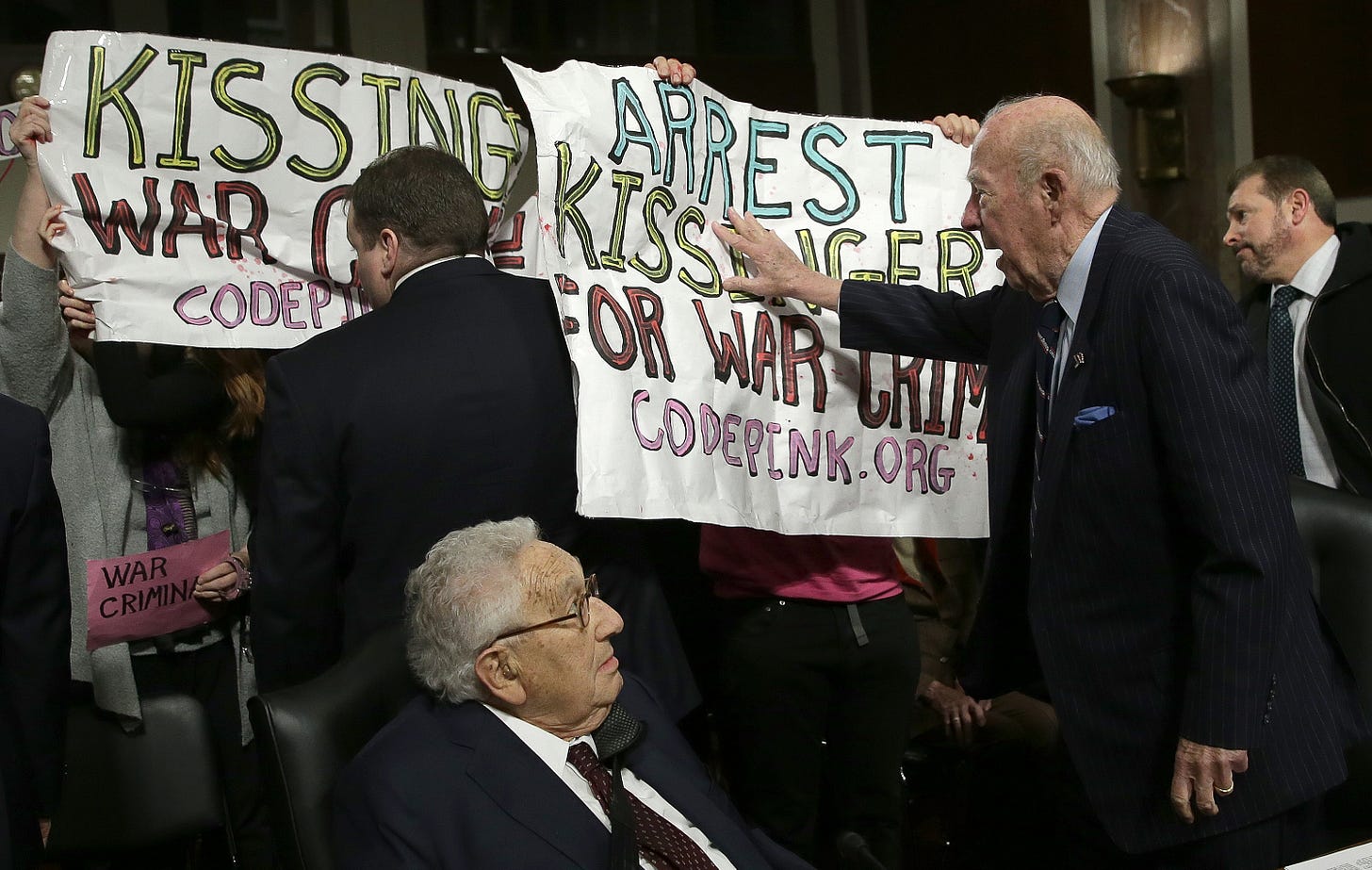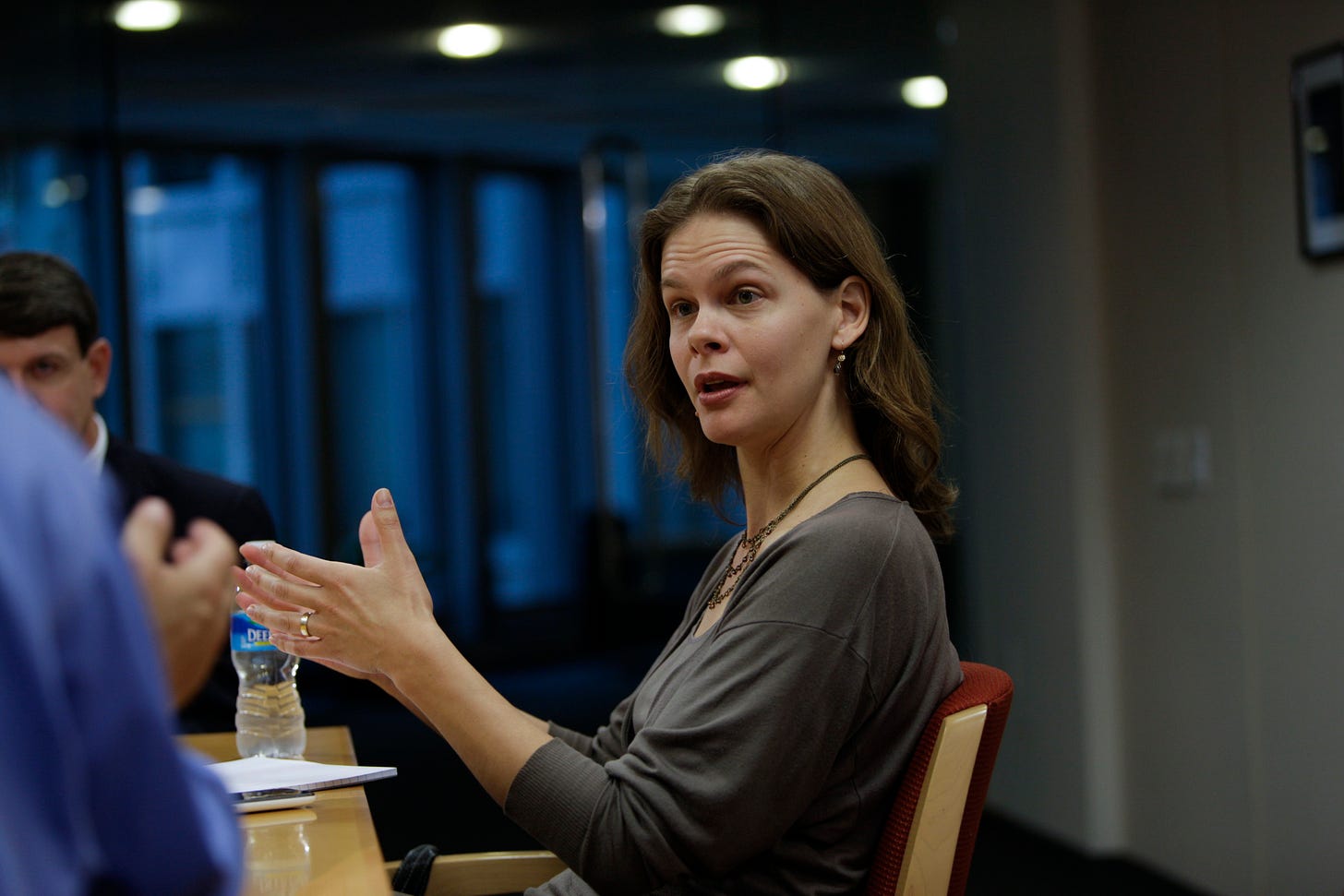Regarding Henry Kissinger
The current Yale scandal highlights the threat of big donors compromising academic freedom
Henry Kissinger is 98 years old. His period of greatest power, when he served as Secretary of State for Richard Nixon and Gerald Ford, is nearly five decades in the past.
The years have not been kind to Kissinger’s reputation, at least among those who have paid attention to the emerging historical record of his tenure in office. It’s become increasingly clear that prior to Nixon’s election in 1968, while working as an advisor to President Lyndon Johnson, Kissinger was employed as a spy on Nixon’s behalf. With Kissinger’s aid, Nixon sabotaged the negotiations Johnson was conducting with North Vietnam. This both ensured Nixon’s victory (as a candidate who could bring peace) and extended the American participation in the war for another five years. Even more cynically, in private Nixon and Kissinger were convinced South Vietnam was not a viable ally. They kept up an unnecessary war merely for the sake of optics (or, to use Kissinger’s favorite euphemism, “credibility”).
The Nixon White House Tapes depict Nixon as a bigot and Kissenger as an obsequious, eager toady ever agreeing with his boss even when Nixon called him “my Jew boy.” In 1973, Nixon went on rants complaining about how congress was calling on him to pressure the Soviet Union to allow Soviet Jews to emigrate. Kissinger agreed that the issue was “not an objective of American foreign policy.” Then he added, “And if they put Jews into gas chambers in the Soviet Union, it is not an American concern. Maybe a humanitarian concern.” The “maybe” is a nice touch, suggesting that even a second Holocaust wouldn’t merit humanitarian concern. That Kissinger was himself a refugee from Nazi Germany adds to the comment’s depravity.
In 1971, while negotiating around the conflict between India and Pakistan, Nixon took swipes at the physical appearance of Indian Prime Minister Indira Gandhi, saying, “undoubtedly, the most unattractive women in the world are the Indian women.” Nixon continued, adding in even more racism, “The most sexless, nothing, these people. I mean, people say, what about the Black Africans? Well, you can see something, the vitality there, I mean they have a little animal like charm, but God, those Indians, ack, pathetic. Uch.” Kisssinger was part of the discussion, although his voice is muffled in the tapes. But neither on this occasion, nor any other, did he challenge Nixon. Instead, he would add in his own racist generalizations, as when he remarked to Nixon, “I tell you, the Pakistanis are fine people, but they are primitive in their mental structure. They just don’t have the subtlety of the Indians.”
As the historian Gary J. Bass argues these grotesque displays of prejudice weren’t just examples of personal flaws, they were also inextricable from the immoral policies that Kissinger and Nixon pursued in egging on a genocidal crackdown in East Pakistan, which led to a war with India and the birth of the nation of Bangladesh in 1971.
I raise Kissinger’s name again because he’s in the center of a major academic freedom controversy at Yale’s Brady-Johnson Program in Grand Strategy. Historian Beverly Gage, who has run the program since 2017, has resigned, citing the undue influence of ultra wealthy donors. According to the New York Times, the two donors are: “Nicholas F. Brady, a former U.S. Treasury secretary under Presidents Ronald Reagan and George H.W. Bush, and Charles B. Johnson, a mutual fund billionaire and leading Republican donor who in 2013 made a $250 million donation to Yale — the largest gift in its history.”
Donor actions have included planning to send inspectors into the classrooms to evaluate what is being taught, calling up Gage to complain about a faculty member who had written an essay critical of Donald Trump and badgering Gage for not teaching Grand Strategy “the way Henry Kissinger would.” Gage quite rightly responded, “That’s absolutely right. I am not teaching Grand Strategy the way Henry Kissinger would.”
The donors have also insisted on imposing a new advisory board, with Kissinger at the head.
A conflict between the Grand Strategy Program and its plutocratic patrons was perhaps inevitable. From its founding, in 2000, the program has been a vehicle for wealthy Republicans to give an intellectual patina to their preferred policies. As New School historian Aaron Jakes notes, “At its inception in the early 2000s, the Grand Strategy program and its faculty—mainly John Lewis Gaddis and Charles Hill—played a pivotal role in helping the Bush administration build its case for war in Afghanistan and Iraq by lending them an aura of intellectual gravitas.”
After the terrorist attacks of September 11, 2001, Gaddis would celebrate George W. Bush in extravagant terms, writing that the Texan had shown “one of the most surprising transformations of an underrated national leader since Prince Hal became Henry V.” Although hardly a Shakespeare scholar, Bush appreciated the compliment and hired Gaddis to be one of the co-writers of Bush’s second inaugural address.
In many ways, the Grand Strategy Program has to be seen as a typical neo-conservative counter-institution, an organization deliberately designed to undermine expert advice, modeled on the “Team B” group set up by neo-conservatives and their allies in the CIA in the late 1970s. Mainstream CIA analysts had come to an assessment (which turned out to be accurate) that the Soviet Union was in rapid decline and posed a diminished threat. Team B was set up to offer an alternative (and, as it turned out, false) view of the Soviet Union as a robust power that thought it could win a nuclear war. This patently false view was used to justify the Carter and Reagan arms build-up in the 1970s and 1980s.
In the same way, the post-9/11 Grand Strategy Program as used by John Lewis Gaddis and Charles Hill functioned as a Team B in opposition to mainstream academic advice. There were countless scholars with expertise in the Middle East and International Relations who warned that Bush’s decision to invade Iraq would have disastrous consequences. The Grand Strategy Program offered an academic respectable arguments for discounting those scholars.
Beverly Gage was completely justified in resigning. The scandal at the Grand Strategy Program at Yale illustrates how shallow much of the public discourse about cancel culture and academic freedom really is. After all, who really has the power to deform academic culture and make academics do their bidding: moneybags like Nicholas F. Brady and Charles B. Johnson or some protesting students? We all know the answer to that question. Much of the “cancel culture” discourse is about clouding over awareness of this basic fact.
The ultra rich have so much money and power that they can foist a decrepit and foul war criminal like Henry Kissinger on a leading university. Kissinger is a wonderfully emblematic figure in the current fight. The Vietnam War broke apart the foreign policy consensus of the early Cold War that had both united the American elite during the early Cold War and also tamped down on popular dissent. The lies and failures of the Vietnam War brought countless people, including students, to the streets. Despite much effort, the old foreign policy consensus has never been fully restored: dissent remains robust. Elevating Kissinger one last time to oversee the Grand Strategy Program is a nostalgic exercise in reimposing the old consensus. It’s a dangerous denial of how much the world has changed, and a slap in the face of academic freedom.
(Edited by Emily M. Keeler)
Share and Subscribe
If you liked this post, please share:
Or subscribe:






One book of note making the case for the Kissinger fraud is outlined on wikipedia:
https://en.wikipedia.org/wiki/The_Trial_of_Henry_Kissinger
"'The Trial of Henry Kissinger', a 2001 book by Christopher Hitchens examining the alleged war crimes of Henry Kissinger, the National Security Advisor and later United States Secretary of State for Presidents Richard Nixon and Gerald Ford. Acting in the role of the prosecution, Hitchens presents Kissinger's involvement in a series of alleged war crimes in Vietnam, Bangladesh, Chile, Cyprus and East Timor."
The ability of conservative financiers to put an 'intellectual patina' on any ad hoc conservative ideological policy for the right price is not unknown, in places like Yale or elsewhere. Just look at the A.E.I., Federalist Society and other neoconservative "think tanks" paid to manufacture pseudoacademic sounding justifications for America's right wing ideological talking heads who help create real life public policy..